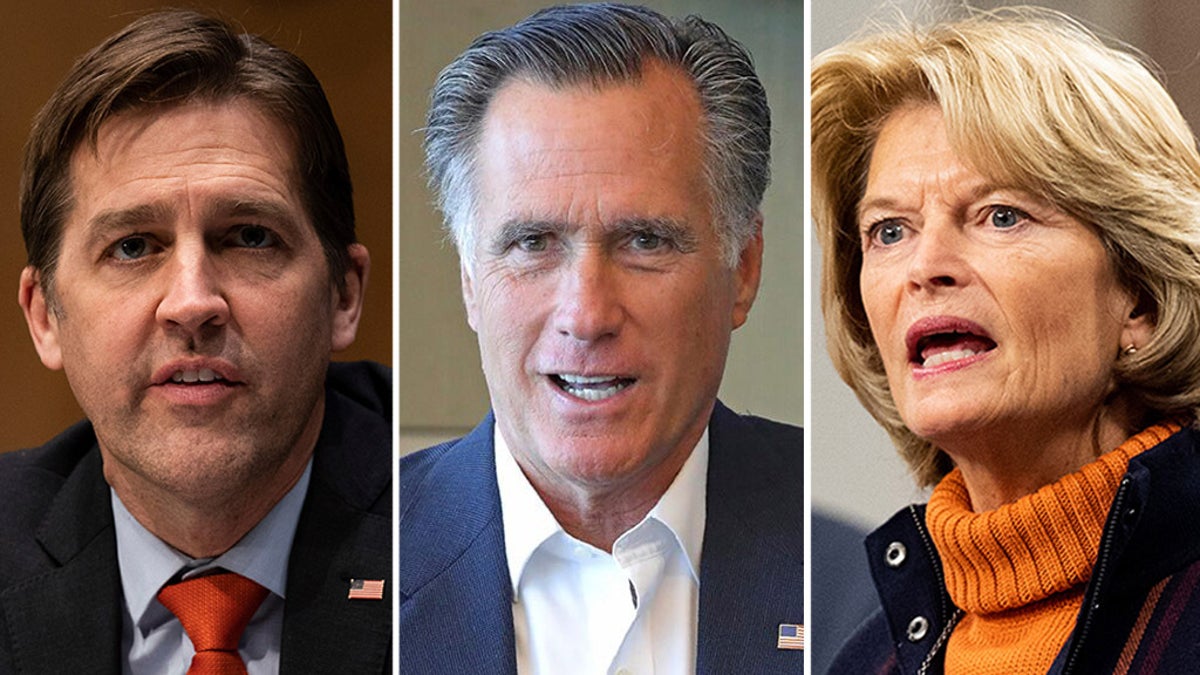Senate acquits Trump in impeachment trial
University of Baltimore law professor Kimberly Wehle and former deputy dependent counsel Sol Wisenberg react on 'America's News HQ'
Former President Trump was acquitted Saturday in the Senate on the impeachment charge of inciting the Jan. 6 Capitol riot – though seven Republican senators still voted with Democrats to convict.
Those Republicans included Sens. Richard Burr of North Carolina, Bill Cassidy of Louisiana, Susan Collins of Maine, Lisa Murkowski of Alaska, Mitt Romney of Utah, Ben Sasse of Nebraska and Pat Toomey of Pennsylvania.
TRUMP ACQUITTED IN SECOND IMPEACHMENT TRIAL ON CHARGE OF INCITING JAN. 6 CAPITOL RIOT
The Republicans issued statements explaining their votes.
"Our Constitution and our country is more important than any one person. I voted to convict President Trump because he is guilty," Cassidy said.
"After careful consideration of the respective counsels’ arguments, I have concluded that President Trump is guilty of the charge made by the House of Representatives," said Romney, who also voted to convict Trump on a separate charge a year ago during the Ukraine impeachment.

Ben Sasse of Nebraska, Lisa Murkowski of Alaska and Mitt Romney of Utah were among the 7 Republican senators who voted to convict Trump.
"I do not make this decision lightly, but I believe it is necessary," Burr said. "By what he did and by what he did not do, President Trump violated his oath of office to preserve, protect, and defend the Constitution of the United States."
"On election night 2014, I promised Nebraskans I’d always vote my conscience even if it was against the partisan stream," Sasse said, adding, "I cannot go back on my word, and Congress cannot lower our standards on such a grave matter, simply because it is politically convenient. I must vote to convict."
Later Saturday, the Executive Committee of the Republican Party of Louisiana unanimously voted to censure Sen. Cassiday for his vote to convict Trump on the impeachment charge.
"We condemn, in the strongest possible terms, the vote today by Sen. Cassidy to convict former President Trump," the group said in a statement. "Fortunately, clearer heads prevailed and President Trump has been acquitted of the impeachment charge filed against him."
A majority of senators found Trump guilty on Saturday in a 57-43 vote, but the number fell short of the supermajority needed to convict the president. Had Trump been convicted, the Senate would have moved to bar the 45th president from holding federal office ever again.
Voting to convict Trump could cause political problems for Republicans. Wyoming Rep. Liz Cheney, for example, has faced backlash and calls to step down from her leadership position in the House over her vote to impeach Trump in the House last month.
Ahead of the vote, there had been speculation that Senate GOP Leader Mitch McConnell could possibly join with those voting to convict the former president. But McConnell voted to acquit.
McConnell's vote had been closely watched since he's been very critical of Trump's role in inciting the Jan. 6 riot, and his wife -- former Transportation Secretary Elaine Chao -- resigned from the administration in the aftermath of the attack that left at least five people dead, including a Capitol Police officer.
TRUMP CELEBRATES ACQUITTAL IN SENATE TRIAL, FORESHADOWS POLITICAL FUTURE: 'MUCH TO SHARE'
McConnell alerted colleagues of his decision Saturday morning via email before the Senate convened for what could have been the final day of Trump's trial for "incitement of insurrection."
Conviction was always going to be an uphill climb, since 17 GOP senators would need to join all 50 Democrats to meet the supermajority threshold.
Fox News' Sally Persons, Kelly Phares and Caroline McKee contributed to this report.













































